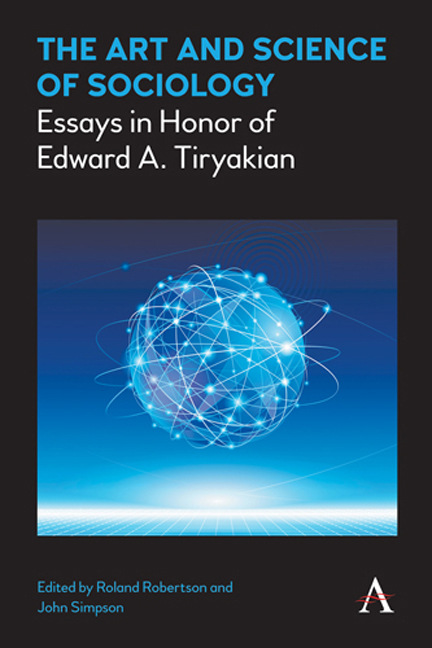Book contents
- Frontmatter
- Contents
- List of Figures and Tables
- List of Contributors
- Acknowledgments
- Introduction
- Chapter 1 The Dynamo and the Diplomat: Tiryakian's Role in Preserving Sorokin's Reputation
- Chapter 2 Edward Tiryakian and Modernization Theory: A Very Special Relationship
- Chapter 3 Developmental Path (Entwicklungsform): A Neglected Weberian Concept and Its Usefulness in the Civilizational Analysis of Islam
- Chapter 4 The Existential Sociology of Edward Tiryakian: Toward an Integrated Paradigm
- Chapter 5 Comparative Reflections on Sociology and Conservatism: The Contributions of Edward A. Tiryakian
- Chapter 6 Contemporary Changes in the Processes of Social Differentiation: Toward an Analytical Version of the Theory
- Chapter 7 Considerations on Global Studies
- Chapter 8 Honoring Edward Tiryakian as a Metasociologist: A Metaconceptual Analysis of Prosumption and Related Concepts
- Chapter 9 Dangerous Nouns of Process: Differentiation, Rationalization, Modernization
- Chapter 10 Modernization as Social Becoming: Ten Theses on Modernization
- Chapter 11 Religion and Evolution
- Chapter 12 The “Axial Age” vs. Weber's Comparative Sociology of the World Religions
- Edward A. Tiryakian's Publications
- Index
Chapter 5 - Comparative Reflections on Sociology and Conservatism: The Contributions of Edward A. Tiryakian
Published online by Cambridge University Press: 22 July 2017
- Frontmatter
- Contents
- List of Figures and Tables
- List of Contributors
- Acknowledgments
- Introduction
- Chapter 1 The Dynamo and the Diplomat: Tiryakian's Role in Preserving Sorokin's Reputation
- Chapter 2 Edward Tiryakian and Modernization Theory: A Very Special Relationship
- Chapter 3 Developmental Path (Entwicklungsform): A Neglected Weberian Concept and Its Usefulness in the Civilizational Analysis of Islam
- Chapter 4 The Existential Sociology of Edward Tiryakian: Toward an Integrated Paradigm
- Chapter 5 Comparative Reflections on Sociology and Conservatism: The Contributions of Edward A. Tiryakian
- Chapter 6 Contemporary Changes in the Processes of Social Differentiation: Toward an Analytical Version of the Theory
- Chapter 7 Considerations on Global Studies
- Chapter 8 Honoring Edward Tiryakian as a Metasociologist: A Metaconceptual Analysis of Prosumption and Related Concepts
- Chapter 9 Dangerous Nouns of Process: Differentiation, Rationalization, Modernization
- Chapter 10 Modernization as Social Becoming: Ten Theses on Modernization
- Chapter 11 Religion and Evolution
- Chapter 12 The “Axial Age” vs. Weber's Comparative Sociology of the World Religions
- Edward A. Tiryakian's Publications
- Index
Summary
Introduction: Classical Sociology
A product of Harvard's famous Department of Social Relations created by Pitirim Sorokin, Professor Tiryakian's academic work has ranged over many issues, but the intellectual focus of his sociology has primarily been Emile Durkheim and the legacy of the Durkheimian School (Tiryakian 2009). Tiryakian's work has engaged with various controversies, both political and academic. Situated in the borderland between American and European social theory, Tiryakian often found himself drawn into the professional and ideological conflicts that erupted in the 1960s and onward between various generations of scholars. Many of these confrontations in the academic world of sociology were influenced by student radicalism in 1969, the Vietnam War and the civil rights movement. He has recently complained that scholars have forgotten the profound disruptions around 1969 on both sides of the Atlantic (Tiryakian 2013: xxiv). More specifically, the ideological conflicts hinged on the charge that sociology—especially in the elite university departments—was inherently conservative, both culturally and politically. For Tiryakian, part of the attraction of Pitirim Sorokin was that he was also famously a critic of mid-century American sociology in his Fads and Foibles in Contemporary Sociology and Related Social Sciences (Sorokin 1956). Consequently Tiryakian's interpretation of Durkheim has been distinctive in rejecting the conventional view that Durkheimian “functionalism” was ultimately a conservative reaction to social change. Sorokin's marginal and often maverick position in American sociology and his view of large-scale civilizational change influenced Tiryakian's deep engagement with Durkheim's key notion of anomie.
Another distinctive feature of this engagement with Durkheim concerns the problematic relationship between philosophy and sociology, on the one hand, and between normative and empirical analysis on the other. In Sociologism and Existentialism Tiryakian (1962) lamented the separation between philosophy and sociology that was bound up in the opposition between the Old World and the New World. This separation was mutually problematic. By ignoring sociology, philosophy—while seeking universal truths—remained bound implicitly to specific cultural contexts. By ignoring philosophy, sociology worked at the microscopic level and failed to address problems of a global significance. The general result was that sociology has failed to develop a global perspective and “research projects accumulate, but are not cumulative.
- Type
- Chapter
- Information
- The Art and Science of SociologyEssays in Honor of Edward A. Tiryakian, pp. 79 - 96Publisher: Anthem PressPrint publication year: 2016

